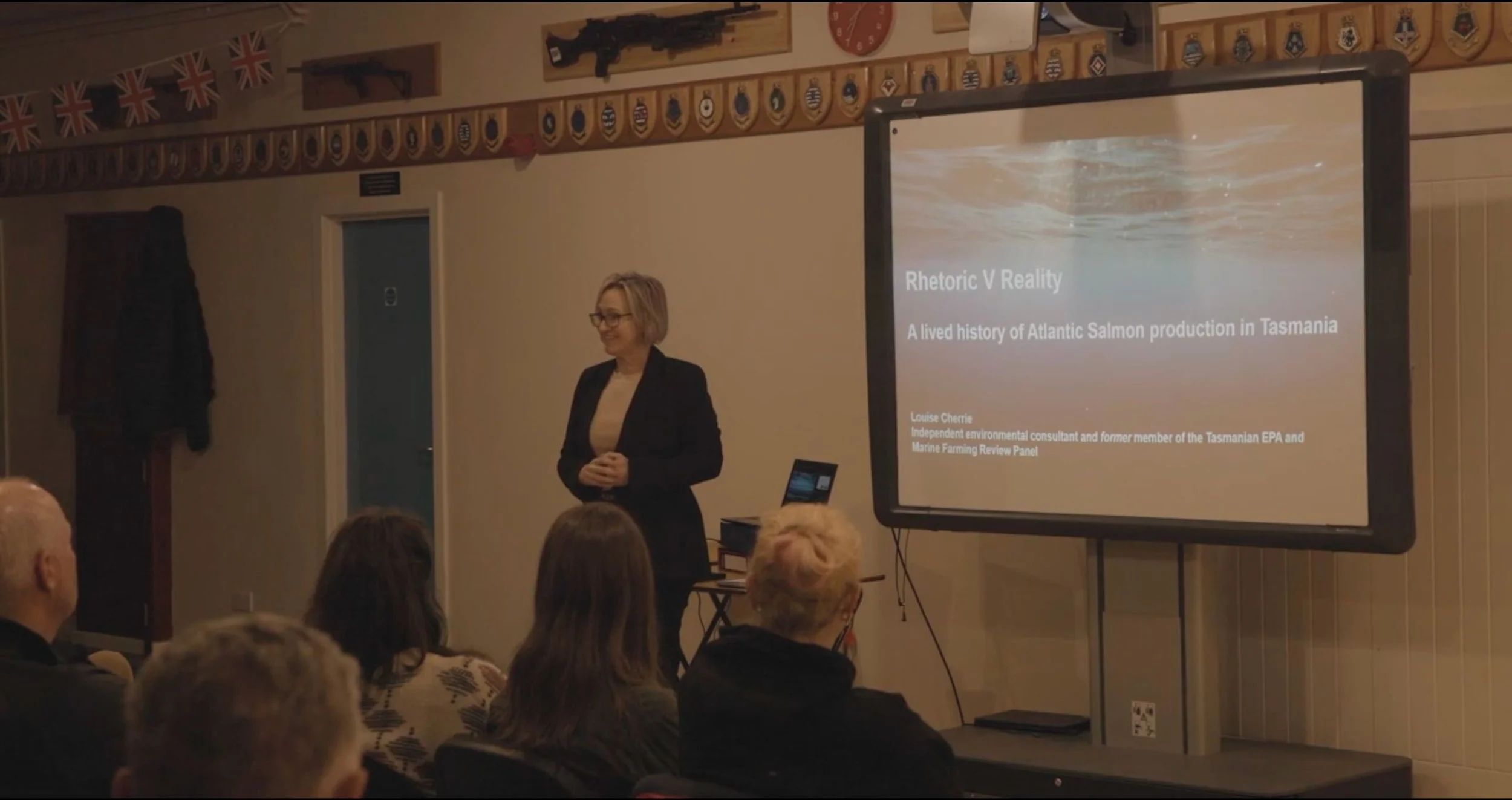
Tasmanian industry consultant Louise Cherrie
Salmon Free Falklands invited Australian industry consultant Louise Cherrie to the Falkland Islands to share information about how open-pen salmon farming impacts the politics, economy and governance of a country, the financial implications and knock-on effects on community.
Louise is a former member of the Tasmanian Marine Farming Review Panel providing advice at Ministerial level, and was the industry representative on the Tasmanian Environment Protection Authority board.
She very kindly offered her time pro bono for this trip and her travel expenses were met by local supporters of SFF.
Paradise Lost
A documentary exposing the loss of social license of salmon feedlot producers in Tasmania, the destructive practices of the Industry, and loss of amenity to waterways by the community.
A film by Justin Kurzel & Conor Castles-Lynch, 2021
This short documentary preceded Louise Cherrie’s presentation on 21 May 2025.
You can watch Paradise Lost here
A letter to Falkland Islanders from Richard Flanagan
Richard Flanagan is an Australian writer, film director and journalist who last year made history when he became the first writer to have won both the Booker and Baillie Gifford Prizes.
His bestselling 2021 book Toxic exposed the salmon production industry to be as secretive as its practices are destructive.
Richard Flanagan’s letter to Falkland Islanders was distributed at Louise Cherrie’s presentation. You can read the letter here
Penguin News interview with Louise Cherrie
Read the full interview here
Copyright and credit Penguin News
FITV interview with Louise Cherrie
Watch this short video here
Copyright and credit FITV
-
Risks of open pen salmon farming outweigh rewards
I came to the Falklands to share the Tasmanian lived history of open pen salmon farming. Much like Tasmania, you are a stunning, wild and unique place with productive marine waters and a fiercely proud island population. Seeing this for myself, I now know more than ever what is at stake.
Whilst I understand the desire for economic diversification, the best of intentions can cause irreparable harm. As a pragmatic ‘industry type’ I believe we need to balance environmental and economic interests to be happy, healthy and self-sustaining. However, the open pen salmon dream you are being sold is in fact a nightmare. The massive nutrient discharges from the proposed 50,000 t salmon industry are equivalent to the nitrogen discharge of over 2,000,000 people. Open pens discharge around 15% of their waste in solid form (not able to be collected in rough water farming) and 85% dissolved in water and unable to be captured. It causes broadscale environmental harm and damages the ecosystem that underpins wild fisheries. It smothers kelp and seabeds preventing settlement by larvae, including loligo. It strips krill from the Southern Ocean for inclusion in feed to dye the flesh to a marketable colour, further destabilising the marine ecosystem. Combine with that chemical and antibiotic use, biosecurity risks, disease and mass mortality events, predation by escaped salmon, high freshwater demands, and 24/7 light and noise, this is an industry that is facing a global backlash. In Tasmania and around the world commercial fishers and businesspeople are now standing up with communities previously written off as “greenies”, “activists” or “anti-everything”. This is not a ‘green’ issue. It’s a mainstream issue with serious negative economic implications.
Am I anti salmon farming? No! I am anti open pen salmon farming. Which other production process is allowed to discharge massive loads of untreated waste into the environment? Front page news for any other industry, business as usual for salmon. So why do they do it? Because it’s the cheapest operational model…and we let them. Even with modern practices, stringent regulations, comprehensive monitoring, and strong enforcement the fact of massive untreated discharges does not change. You cannot ‘policy write’ your way out of that. Even if you did apply the enormous public funds required to establish the framework and regulate the industry, the basic fact remains: The pens are open, discharge occurs.
In 2022 your MLAs decided not to entertain a request to establish an open pen salmon industry in the Falklands. That decision resonated around the world to those of us seeking hope that someone can stand up to the salmon barons. However, it is an industry that does not take no for an answer and the industry legal challenge that followed was from the classic playbook used globally. Casting aside the procedural error, the MLAs decision showed great foresight and the highest level of marine stewardship. You now have the opportunity through the consultation period to lead the world by standing your ground. In Tasmanian we were afforded no such luxury. We now fight, along with many other countries, to get them out of our public waterways.
When you are asked to have your say on open pen salmon farming there will be many views on, amongst other things, the economic returns, damage to ecotourism, the social impact of an imported workforce, and FIG ability to regulate. It is very important to listen and become informed. However, at its core, the only thing you really need to consider is whether you accept the equivalent nutrient discharge of 2,000,000 people and the risk that poses to your precious islands and commercial fisheries. If your answer to that is no, then in my view, the response to public consultation can only be Option 1 (no salmon farming in the Falklands). They are your waterways, and you have the upper hand. Once the door is open to salmon more will come and your rights, much like the environment, will be slowly degraded. Profits will flow offshore leaving you to bear the brunt of the damage. Tasmanians who have been fighting to regain our waterways stand with you, and the world is watching and waiting for someone to have the foresight and strength to say no before it begins.
Louise Cherrie
Former member of the Tasmanian EPA and Marine Farming Review (Ministerial advisory) Panel, and independent environmental consultant to heavy industry






